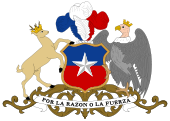- Chilean national plebiscite, 1988
-
Chile 
This article is part of the series:
Politics and government of
Chile- Law
- President
- National Congress
- Ministries
- Political parties
- Elections
- Administrative divisions
- Foreign relations
The 1988 Chilean national plebiscite was a national referendum held to determine whether or not dictator Augusto Pinochet would extend his rule for another eight-year term in office. It was held on October 5, 1988. The No side won with 55.99% of the vote, and Pinochet renounced office, putting an end to the 16½ year military dictatorship.
Contents
Background
Army General Augusto Pinochet took power on September 11, 1973 in a coup d'état which deposed the democratically-elected Socialist President Salvador Allende. Allende killed himself while the presidential palace was being bombarded. A military junta —led by Pinochet, Air Force General Gustavo Leigh, Navy Admiral José Toribio Merino, and Carabinero Chief General César Mendoza— was sworn in that same evening. The following day, the four drafted an official document suspending the 1925 constitution and Congress and establishing the Junta as Chile’s supreme power. Pinochet was designated as its first President, and the four verbally agreed to rotate the office. Shortly after, the Junta established an advisory committee, which Pinochet was successful in staffing with Army officers loyal to himself. One of their first recommendations was to discard the idea of a rotating Presidency, arguing it would create too many administrative problems and lead to confusion.[1] In March 1974, six months after the Junta’s establishment, Pinochet verbally attacked the Christian Democrat Party and stated that there was no set timetable for the return to civilian rule. On December 18, 1974 Pinochet was declared Supreme Leader of the nation.[1] After that date, the junta functioned strictly as a legislative body until the return to democracy in 1990.
On September 24, 1973, a commission was set up by the junta to draw up a blueprint for a new constitution. By October 5, 1978, the commission had finished its work. During the next two years, the proposal was studied by the Council of State presided by former president Jorge Alessandri, and on July 1980 it submitted a Constitution draft to Pinochet and the Junta. A highly irregular national plebiscite took place on September 11, 1980, where the Constitution was approved by 67%. The Constitution, which took effect in March 1981, established a "transition period," where Pinochet would continue to exercise the executive power and the Junta the legislative power, for the next eight years. Before that period ended, a candidate for President was to be proposed by the Commanders in Chief of the Armed Forces and Carabinero Chief General for the following period of eight years. The candidate was to be ratified by voters in a national plebiscite. On August 30, 1988 Pinochet was declared the candidate.
Plebiscite
The plebiscite consisted of two choices:
- Yes: The proposed candidate is approved. Pinochet takes office on March 11, 1989 for the following eight years and parliamentary elections take place nine months after he is sworn in. The Junta continues to exercise the legislative power until the newly elected Congress takes office on March 11, 1990.
- No: The proposed candidate is rejected. Pinochet and the Junta continue in power for another year. Presidential and parliamentary elections take place three months before Pinochet's term expires. The newly elected President and Congress take office on March 11, 1990.
Results
Option Votes % Result Yes 3,119,110 44.01 No 3,967,569 55.98 Proposal rejected Valid votes 7,086,679 100.00 Null votes 94,594 1.30 Blank votes 70,660 0.97 Total votes 7,251,933 100.00 Registered voters 7,435,913 97.52% turnout References
External links
- El plebiscito presidencial de 1988 (in Spanish)
 Elections and referendums in Chile
Elections and referendums in ChilePresidential elections Parliamentary elections 1811 · 1818 · 1823 · 1824 · 1825 · 1827 · 1829 · 1831 · 1834 · 1837 · 1840 · 1843 · 1846 · 1849 · 1852 · 1855 · 1858 · 1861 · 1864 · 1867 · 1870 · 1873 · 1876 · 1879 · 1882 · 1885 · 1888 · 1891 · 1894 · 1897 · 1900 · 1903 · 1906 · 1909 · 1912 · 1915 · 1918 · 1921 · 1924 · 1925 · 1930 · 1932 · 1937 · 1941 · 1945 · 1949 · 1953 · 1957 · 1961 · 1965 · 1969 · 1973 · 1989 · 1993 · 1997 · 2001 · 2005 · 2009Municipal elections 1935 · 1938 · 1941 · 1944 · 1947 · 1950 · 1953 · 1956 · 1959 · 1963 · 1967 · 1971 · 1992 · 1996 · 2000 · 2004 · 2008Referendums See also: Elections in Pichilemu Categories:- 1988 elections in South America
- 1988 in Chile
Wikimedia Foundation. 2010.
